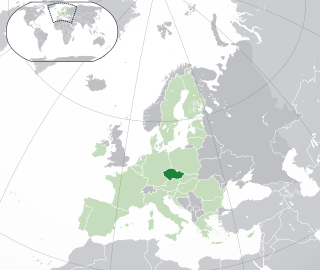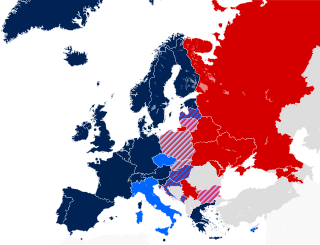
The Czech Republic, also known as Czechia, is a landlocked country in Central Europe. Historically known as Bohemia, it is bordered by Austria to the south, Germany to the west, Poland to the northeast, and Slovakia to the southeast. The Czech Republic has a hilly landscape that covers an area of 78,871 square kilometers (30,452 sq mi) with a mostly temperate continental and oceanic climate. The capital and largest city is Prague; other major cities and urban areas include Brno, Ostrava, Plzeň and Liberec.

The Czech Republic is a Central European country, a member of the European Union, the Organisation for Economic Co-operation and Development (OSCE), the North Atlantic Treaty Organization (NATO), the United Nations. It entertains diplomatic relations with 191 countries of the world, around half of which maintain a resident embassy in the Czech capital city, Prague.

Prague is the capital and largest city in the Czech Republic, and the historical capital of Bohemia. On the Vltava river, Prague is home to about 1.3 million people. The city has a temperate oceanic climate, with relatively warm summers and chilly winters.

This article is about the demographic features of the population of the Czech Republic, including population density, ethnicity, education level, health of the populace, economic status, and religious affiliations.
Same-sex marriage, also known as gay marriage, is the marriage of two people of the same legal sex. As of 2023, marriage between same-sex couples is legally performed and recognized in 34 countries, constituting some 1.35 billion people, with the most recent being Andorra.
Same-sex marriage in Denmark has been legal since 15 June 2012. A bill for the legalization of same-sex marriages was introduced by the Thorning-Schmidt I Cabinet, and approved by the Folketing on 7 June 2012. It received royal assent by Queen Margrethe II on 12 June and took effect three days later. Denmark was the eleventh country in the world to legalize same-sex marriage. It was the first country in the world to enact registered partnerships, which provided same-sex couples with almost all of the rights and benefits of marriage, in 1989.
The Czech Republic has offered registered partnerships for same-sex couples since 1 July 2006. Registered partnerships grant several of the rights of marriage, including inheritance, the right to declare a same-sex partner as next of kin, hospital visitation rights, jail and prison visitation rights, spousal privilege, and alimony rights, but do not allow joint adoption, widow's pension, or joint property rights. The registered partnership law was passed in March 2006 and went into effect on 1 July 2006. The country also grants unregistered cohabitation status to "persons living in a common household" that gives couples inheritance and succession rights in housing.

The Czech Republic is often considered the most progressive former Eastern Bloc country in regards to lesbian, gay, bisexual, and transgender (LGBT) rights. In 2006, it legalized registered partnerships for same-sex couples, and a bill legalizing same-sex marriage was being considered by the Parliament of the Czech Republic before its dissolution for the 2021 Czech legislative election, when it died in the committee stage.
This is a list of notable events in the history of LGBT rights that took place in the year 2006.
This is a history of same-sex unions in cultures around the world. Various types of same-sex unions have existed, ranging from informal, unsanctioned, and temporary relationships to highly ritualized unions that have included marriage. State-recognized same-sex unions have recently become more widely accepted, with various countries recognizing same-sex marriages or other types of unions. A celebrated achievement in LGBT history occurred when Queen Beatrix signed a law making Netherlands the first country to legalize same-sex marriage.
The legal status of same-sex marriage has changed in recent years in numerous jurisdictions around the world. The current trends and consensus of political authorities and religions throughout the world are summarized in this article.

Obec is the Czech and Slovak word for a municipality. The literal meaning of the word is "commune" or "community". It is the smallest administrative unit that is governed by elected representatives. Cities and towns are also municipalities.

Vietnamese people in the Czech Republic, including citizens and non-citizens, are the third-largest ethnic minority in the country overall, numbering more than 83,000 people according to the 2011 census.

Debate has occurred throughout Europe over proposals to legalise same-sex marriage as well as same-sex civil unions. Currently 33 of the 50 countries and the 8 dependent territories in Europe recognise some type of same-sex union, among them most members of the European Union (24/27).
Same-sex marriage in Nevada has been legally recognized since October 9, 2014, when a federal district court judge issued an injunction against Nevada's enforcement of its same-sex marriage ban, acting on order from the Ninth Circuit Court of Appeals. A unanimous three-judge panel of the Ninth Circuit had ruled two days earlier that the state's ban on same-sex marriage was unconstitutional. Same-sex marriage was previously banned by an amendment to the Constitution of Nevada adopted in 2002. The statutory and constitutional bans were repealed in 2017 and 2020, respectively.

LGBT rights in the European Union are protected under the European Union's (EU) treaties and law. Same-sex sexual activity is legal in all EU member states and discrimination in employment has been banned since 2000. However, EU states have different laws when it comes to any greater protection, same-sex civil union, same-sex marriage, adoption by same-sex couples.

The Czech Republic provides a wide variety of civil rights to female citizens and Czech women have a long history of actively participating in Czech society. However, women in the Czech Republic continue to experience gender discrimination, particularly in the workforce and political arena.
Same-sex marriage in the Northern Mariana Islands was legalized by the U.S. Supreme Court's landmark ruling in Obergefell v. Hodges on June 26, 2015, which struck down same-sex marriage bans nationwide. On June 29, Governor Eloy Inos issued a statement hailing the decision as "historic", and said he would work with the Attorney General and local officials in the Northern Mariana Islands to bring the U.S. territory into compliance. Attorney General Edward Manibusan issued a memorandum on June 30 confirming that the territory was bound by the court decision and said that marriage license forms would be changed to include same-sex couples.
Same-sex unions are currently not recognized in Namibia. Although the High Court of Namibia agreed in principe on 20 January 2022 that the marriage inequality faced by same-sex couples is unacceptable, it ruled that it was bound by a 2001 Supreme Court case that domestic law does not recognise same-sex relationships. The plaintiffs announced they would consider appealing the decision to the Supreme Court to have its previous ruling overturned.

The COVID-19 pandemic in the Czech Republic is part of the worldwide pandemic of coronavirus disease 2019 caused by severe acute respiratory syndrome coronavirus 2. The first three confirmed cases in the Czech Republic were reported on 1 March 2020. On 12 March, the government declared a state of emergency, for the first time in the country's modern history for the area of the entire country. On 16 March, the country closed its borders, forbade the entry of foreigners without residence permits, and issued a nationwide curfew. While originally planned to be in effect until 24 March, the measures were later extended until 1 April and then again until the end of State of Emergency which was extended by the Chamber of Deputies until 30 April 2020 and then again until 17 May 2020.











